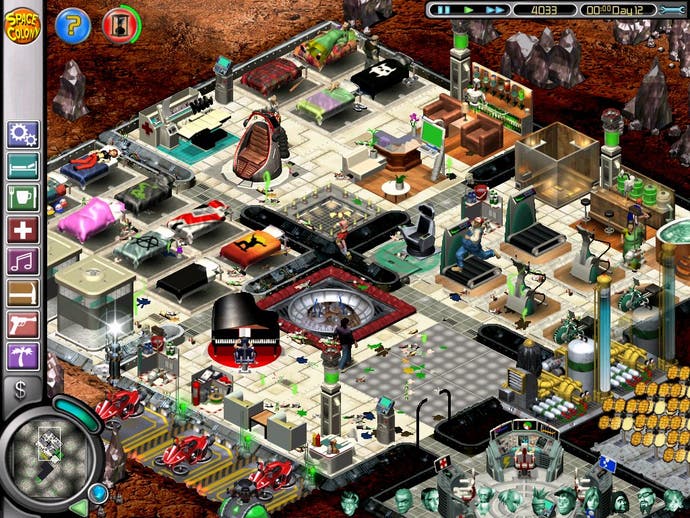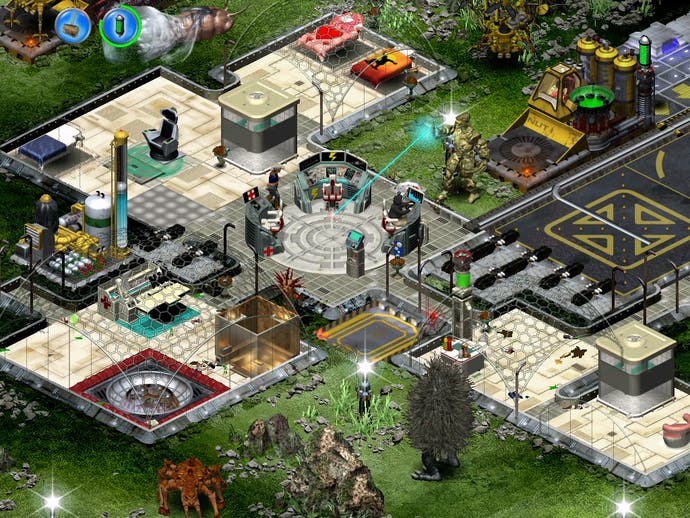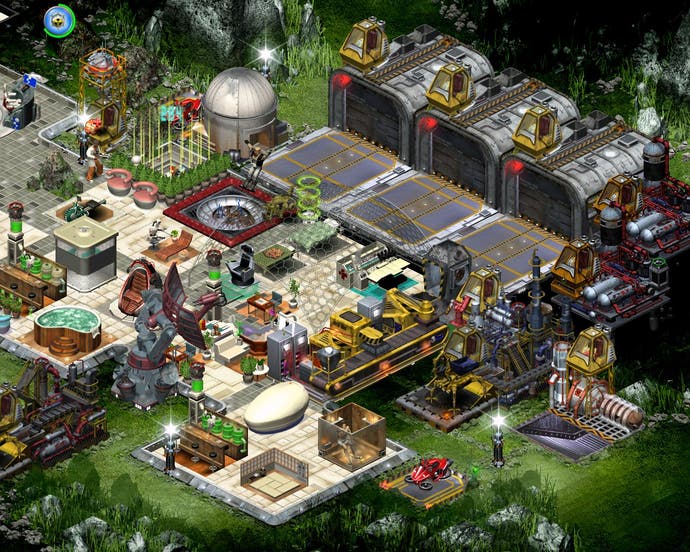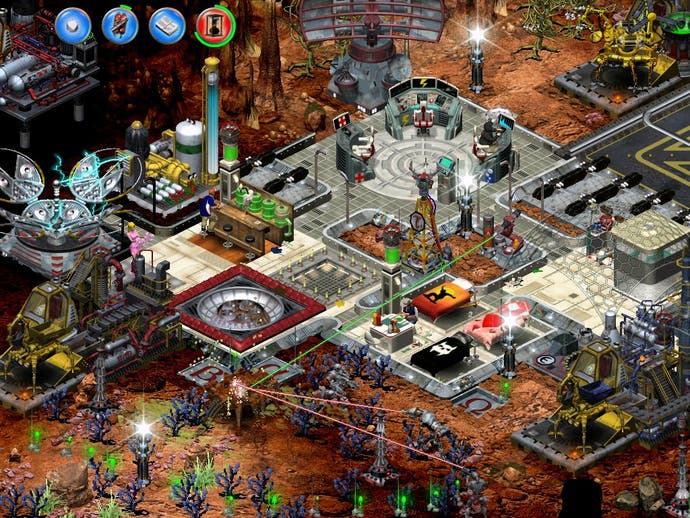Space Colony
We get bored of Martin and send him into space.
Will humans ever colonise space? It's a question that has plagued at least one person (me) since... well, a few days ago, when I first got my hands on Firefly's Space Colony. It's a game that raises a lot of important questions: When we colonise Mars, will there be giant space spiders and hideous plants that give birth to swarms of giant bees? Will we be able to remotely control big robots that eat rocks and farm ugly little space chickens? And most importantly: is Space Colony actually any good?
Lost in space

Space Colony will immediately appeal to two groups of people: Those who like The Sims, and... actually, that's it. Space Colony essentially is The Sims, but with multiple beings, in space and quite a lot geekier. You've got these colonists who move into their new astral home, and they have a chart of personal needs to attend to, jobs to do at the bidding of Blackwater Industries, relationships to build and lives to generally lead.
The game's core is its story mode, which is itself split into two parts. One part deals with peaceful missions to do with making money and building relationships, and this serves as a good way to learn about how the game works in more detail than the simple tutorial provides. The second part of the story mode provides more militaristic challenges, defending colonies and battling the hostile inhabitants of each planet.
The stories are meant to focus on a lead character called Venus and chart her time doing the bidding of the company, but as more and more characters join Venus and friends in the colony, her importance as a character tends to fade. As it is, any kind of narrative is only provided at the start of each objective when Venus chips in with her thoughts on some of the new faces that join her.
Once you start, it's pretty obvious from the outset that Space Colony is disappointingly lacking, visually. Your isometric viewpoint is locked in place, and the 2D sprites all have a cheap, budget-value look to them. Some decent animation would have been a trade-off, but the characters and machinery are lacking in frames, moving about the scenery slowly and awkwardly. At least the voice acting goes some way to making up for the poor visuals, endowing each of the comical characters with well realised stereotypes and giving them a lease of life the graphics can't offer.
Lander

When a team of "Landers" arrive at a colony in the story mode, the main bridge will be occupied by three initial characters. The first task will be to assign them jobs and somewhere to sleep. Each colony requires three basic resources: food, oxygen and power, each one requiring almost constant maintenance from inhabitants. Typically, new arrivals at the colony will be trained up to basic levels of power and oxygen maintenance, so you can set them to work immediately at their stations on the bridge while you drag and drop beds into a biodome for them to sleep in. The object placement tools will be immediately familiar to anyone who's played some kind of management sim, be it the management of people, theme parks or what-have-you.
Biodomes form the general structure of the base, and come in small, medium and large sizes. Once you have a couple of domes placed, you can connect them by placing a small path, and place airlocks to give the inhabitants access to the terrain outside. Once you've got basic accommodation taken care of you need to construct some machinery to extract nutrients from surrounding vegetation, and these are stored in the warehouse and spread around the base in vending machines and other dining facilities as food. That's your three essential colonist needs taken care of.
But then we get to the Sims aspect of Space Colony. Each individual character has a specific set of needs that also need to be taken into consideration if you're going to have any hope at all getting your base running smoothly. Some characters require entertainment, some get hungry easily, and some just want a friend to chat to. It helps to pay careful attention to new arrivals and take care of their specific needs by placing specialist equipment, such as a gym or a dance floor for recreation, and plenty of places to eat and drink to take care of food as well as social needs. Once a character has their needs sufficiently catered for, then they will be happy to work for much longer at the jobs you give them.
Space Nanny

However, it's not long before things start getting a lot more complicated. Each mission brings more new Landers to the base, as well as objectives, and before long your colony is a bustling hive of activity. Some new colonists will be completely unskilled and can be assigned to basic cleaning duties until the opportunity arrives for them to do something more useful with themselves. Usually this will involve building a library and getting them to study objective-related courses, such as space chicken farming, robotics, engineering, medical skills and such. Once the study clock has ticked down, they'll be able to use specialist equipment and help keep the base running hunky dory.
Mission objectives are certainly challenging, but they're not always much fun, ranging from harvesting a set amount of a resources for sale to other companies, to cajoling a couple into becoming "special friends", to rescuing a colony under attack from bloody great slug things pooping out wasps or something. Completely irrespective of the importance of the task though, colonists will only work within their set shift time, and this is determined by how happy they are. So if a manned gun is picking off marauding aliens in the middle of a huge firefight and the chap at the controls gets a bit hungry, he'll clamber out of the gun and grab a bite to eat instead of defending the base; the colonists' complete inability to actually properly take care of themselves is Space Colony's major flaw.
As The Sims taught me, nannying an individual really isn't that fun. Why should I have to tell this person to go to the toilet or clean themselves? Imagine the same kind of nannying in Space Colony, but on a far larger scale - at some stages, something like twenty individuals each require you to keep tabs on their needs and take them for a dance, get something to eat, go to bed or get them to work. At times the task of simply getting the colonists to mind their own business is too much effort on top of the base micromanagement, resource gathering and of course completing mission objectives.
In space, no one can hear you yawn

Despite this, the story section won't take too long to get through, so elsewhere there are the Galaxy and Sandbox modes to keep you occupied. Galaxy allows you to planet hop, visiting systems and completing the missions of varying difficulty that they have to offer, and the completion of some will unlock others. You can decide your own path through the planets, picking and choosing which missions to take and which to leave until later. Sandbox is completely open-ended, offering a few planets with a description and allowing a player to start up a colony and expand to their heart's content.
While there appears to be quite a lot to do, the novelty of running a colony in a galaxy far, far away becomes stale quite quickly. The story mode is actually a fair amount more entertaining than the rest of the game, not because of the narrative, but simply because the notion of progression and achievement is far more satisfying than picking missions at random. Outside story mode, you'll have all of the characters and all of the equipment thrown at you in a fairly short space of time, and eventually there will be little reason to carry on slugging your guts out trying to keep the base running.
Space Colony gets off on a good foot, but falls into the same trap as many other games of its ilk, becoming repetitive and offering little in the way of rewards over time. Once a player has exhausted all of the mission possibilities, there isn't even a multiplayer mode to turn to. Firefly has offered a level editor with the game, allowing players to compile their own campaigns or swap them over the net, but I can't see this breathing much life into a title that exhausts its appeal so quickly. Nevertheless, it's undoubtedly one for the management fetishists.

